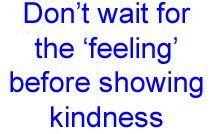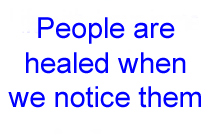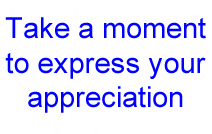13 Secret Behaviors
continued from Page 1
2. Make eye contact. If possible, look the person in the eyes briefly, with warmth. Look at their face. Combine your eye contact with a greeting and a smile. “The eyes are the windows of our soul,” the Bible says. We must look in them. To be looked at, personally, is medicine for the soul.
3. Act friendly. The emphasis here is on the word ACT. We do not just follow our feelings. We show friendliness, whether we feel that way or not. We do what is good, right, needed, necessary, and mature.
Regardless of what we may be feeling, we can send a message of friendliness. The amazing thing is that when we act friendly, we not only lift another’s spirits, but we, also, end up feeling better.
4. Offer compliments. “You look good”. “I like doing business with you.” “You have a good attitude.” “I love your smile.” Inside us, and everyone, are many appreciative feelings, words of admiration, and gratitude. Most of them remain unexpressed, kept inside ourselves. We must let them out. Spread, spray, sprinkle good thoughts on people.
 We can take a moment during, or after, any transaction and put into words a short sentence of thankfulness, appreciation or admiration. Make it simple, direct, and personal.
We can take a moment during, or after, any transaction and put into words a short sentence of thankfulness, appreciation or admiration. Make it simple, direct, and personal.
It helps to plan ahead to offer such a parting gift. Take five seconds and think about what you will say—then say it with a smile.
Example: I was on the telephone trying to get repair services for our home phone. As the service representative finished with me, I paused and then said, “You are really a nice person.” She literally gasped and then gushed her appreciation.
5. Say “thank you”. Whatever anyone does for you—if they fill out a form, hand you a check or receipt—point something out and say “Thank you,” or “I appreciate your help.”
Do this even in unexpected places, like with a mechanic or a dentist. I have said to my own dentist. “Thank you for the way you take care of me.” Surprise people with friendly words of appreciation.
Example: I answered a phone call from the Laguna Playhouse. The caller was selling tickets for their upcoming series. There was no chance we would be interested, and her call was intruding on an important project on which I was working.
Nevertheless, I said “Thank you for calling us. I appreciate your interest in our attending your productions.” Needless to say, she concluded the call with exceptional warmth and kindness.
6. Show interest: Ask about their work, their car, their home, their children or grandchildren, pets, vacations, trips.
“When time allows” is an important qualifier here. Asking such questions, and then abruptly leaving, can cancel everything gained.
When you ask the question, you must allow the time for them to answer. Attentive listening is vital. Showing interest is a powerful form of friendliness.
7. Smile generously. Your smile is always available. Remember to turn it on. Anyone, regardless of age, or level of intelligence, can lift another’s spirits with a smile. Not only is that person lifted, the one smiling is, too.
Putting on a smile makes the person offering the smile feel better. Smiling even raises our immunity level. Frowns generate bad chemicals. Smiles produce beneficial chemicals.
8. Notice and mention feelings. One goal of friendliness is to lift another’s spirits. It is comforting and heartwarming when someone notices and acknowledges feelings. We heal someone more that way than when we try to change their sorrow, fear or anxiety by offering advice we think will help.
For example, noticing a tear in someone’s eye, we can say, “You’re feeling sad…” That is more heart-warming than “Cheer up”! Hurt feelings are healed by naming them–”that hurts, doesn’t it”.
Sympathetic words are more helpful than reminding them that Jesus cares. Jesus’ love is effectively communicated by caring people showing understanding.
9. Notice: their clothing, jewelry, pins, haircuts, even scars and disabilities. Ask, inquire, lament, comment, praise, appreciate: “Interesting pin.”
“Great colors.” “I love your car.” “Sharp tie.” “That’s quite a scar on your arm, how’d that happen?” Noticing is friendliness alive.
10. Use names. Remember names. Say them, and repeat them. Spell them to lock the names into your memory. Use them as much as possible. “Good morning, Harry.” “Have a good day, Gerry.” Ask for names. Keep on asking until you remember them. This is valuable risk-taking.
11. Give a well-wishing farewell. “It was good to see you today.” Or “It has been a pleasure meeting with you today.” Even if it is merely a committee meeting, or a consultation with one or two persons, when you leave, say appreciative words about being with them.
Avoid just departing silently. When you leave a gathering, declare clearly, “I really enjoyed being with you today.” A parting sentence often heard after some kind of transaction is “Have a great day.” You can then respond with, “I will, and you just made it better.”
12. Return phone calls. Do this as promptly as possible, and certainly the same day.
Also, acknowledge e-mail messages and forwards. Your response doesn’t have to be long; it can be as simple as “thank you.”
13. Touch. Hug. Touching someone’s hand, or laying a hand on their shoulder, or shirt sleeve, is a friendly gesture. It is positive.
Caution! Not all touch is appreciated. Some is inappropriate. Touch with care. Not everyone likes to be hugged.
Offer hugs with close attention to the other’s body language, which says “yes” or “no”. Hugging is an increasingly welcomed gesture, but it is not yet universal.
![]()
These ‘Secret Behaviors’ are not truly secret—but they are far too often overlooked. They are overlooked because they are simple.
And, because they are simple, you can easily add them into your everyday encounters.
Because they are simple, they are easy to remember; easy to do.
Start today to sprinkle these acts of kindness all around you and watch how the people you encounter blossom from your attention.
